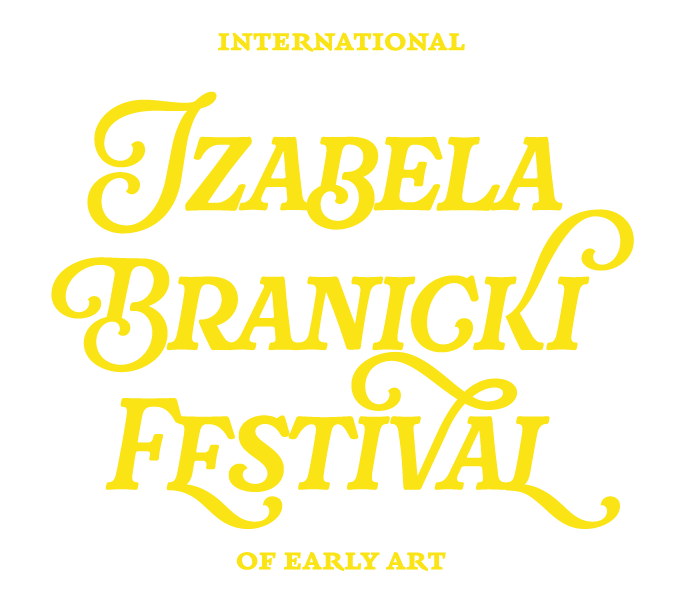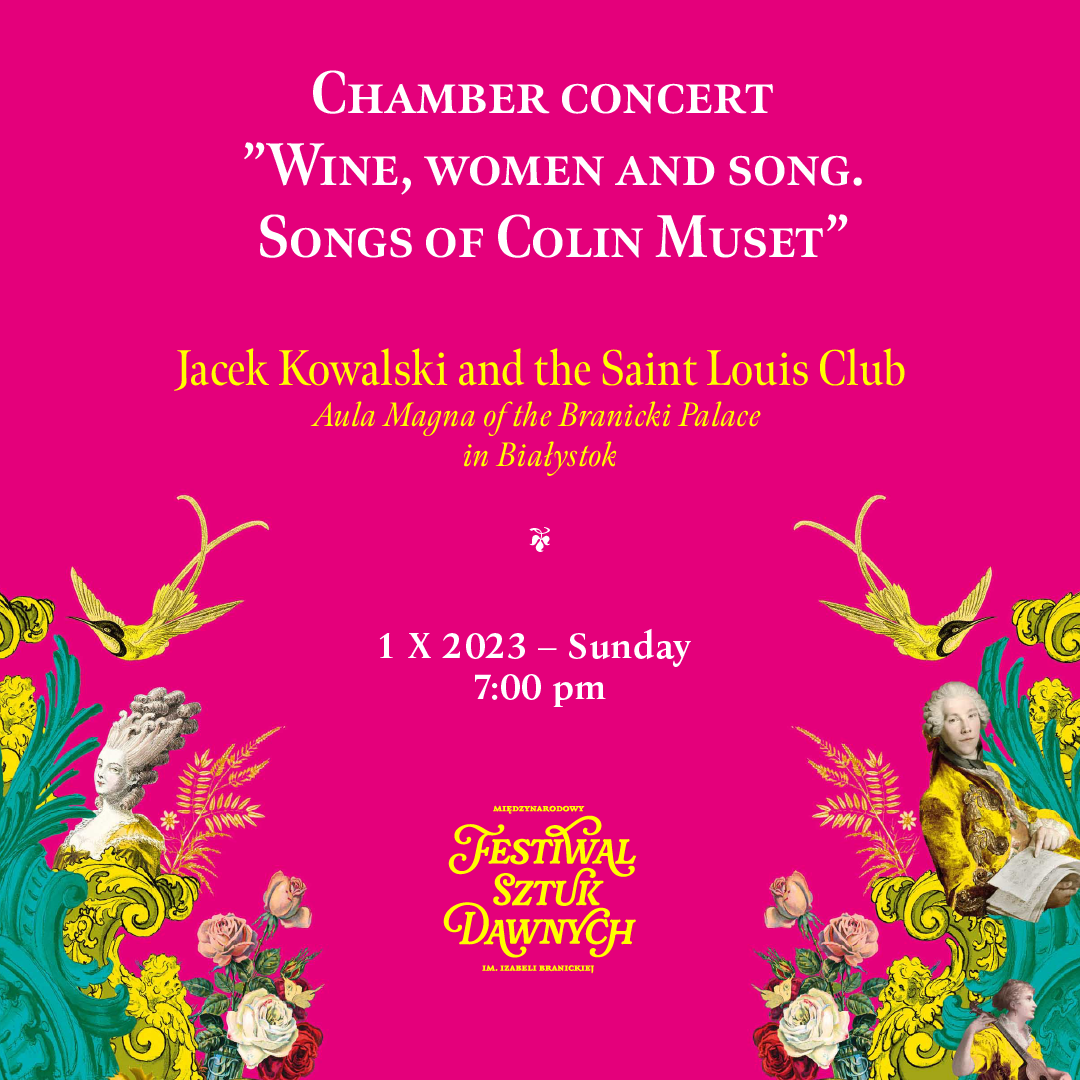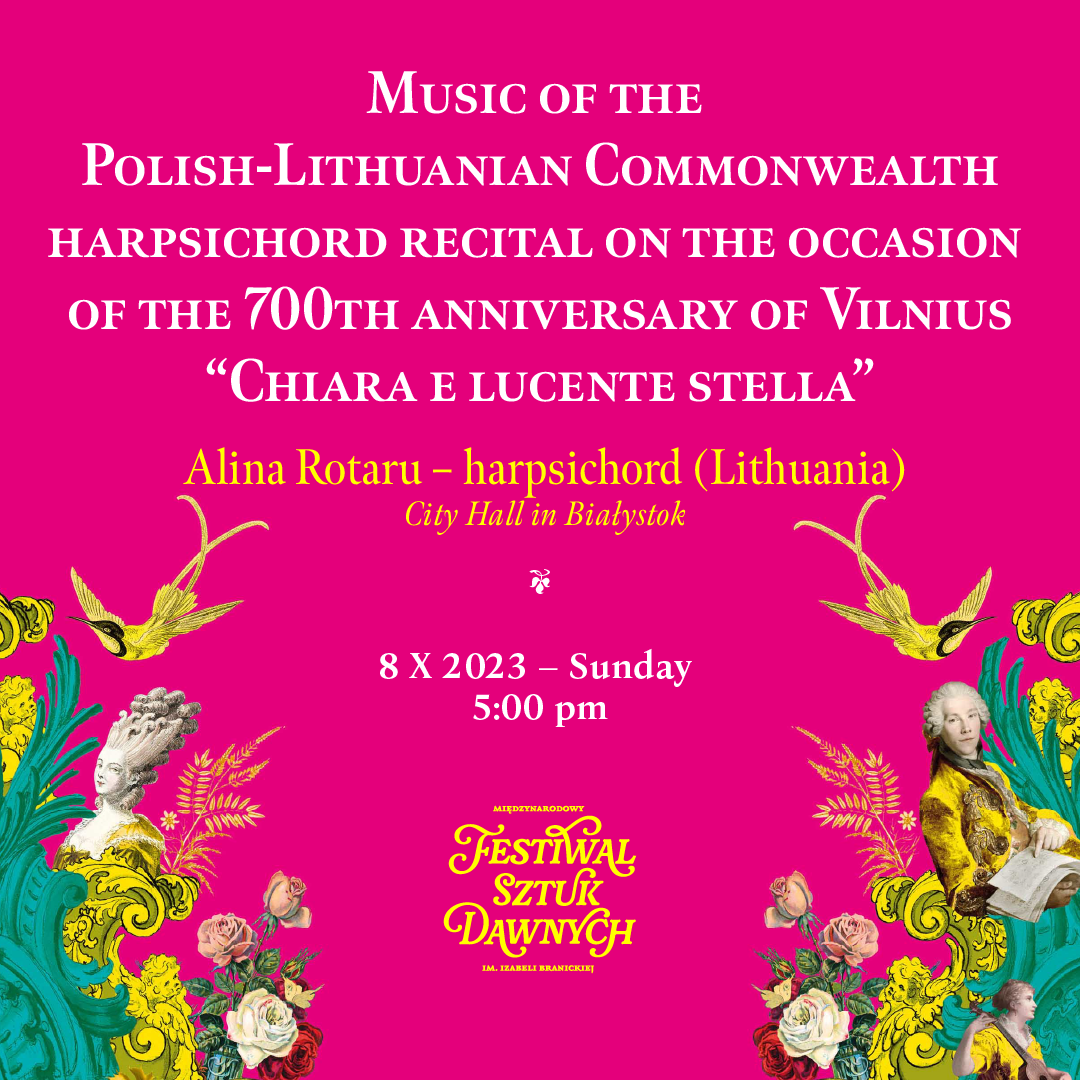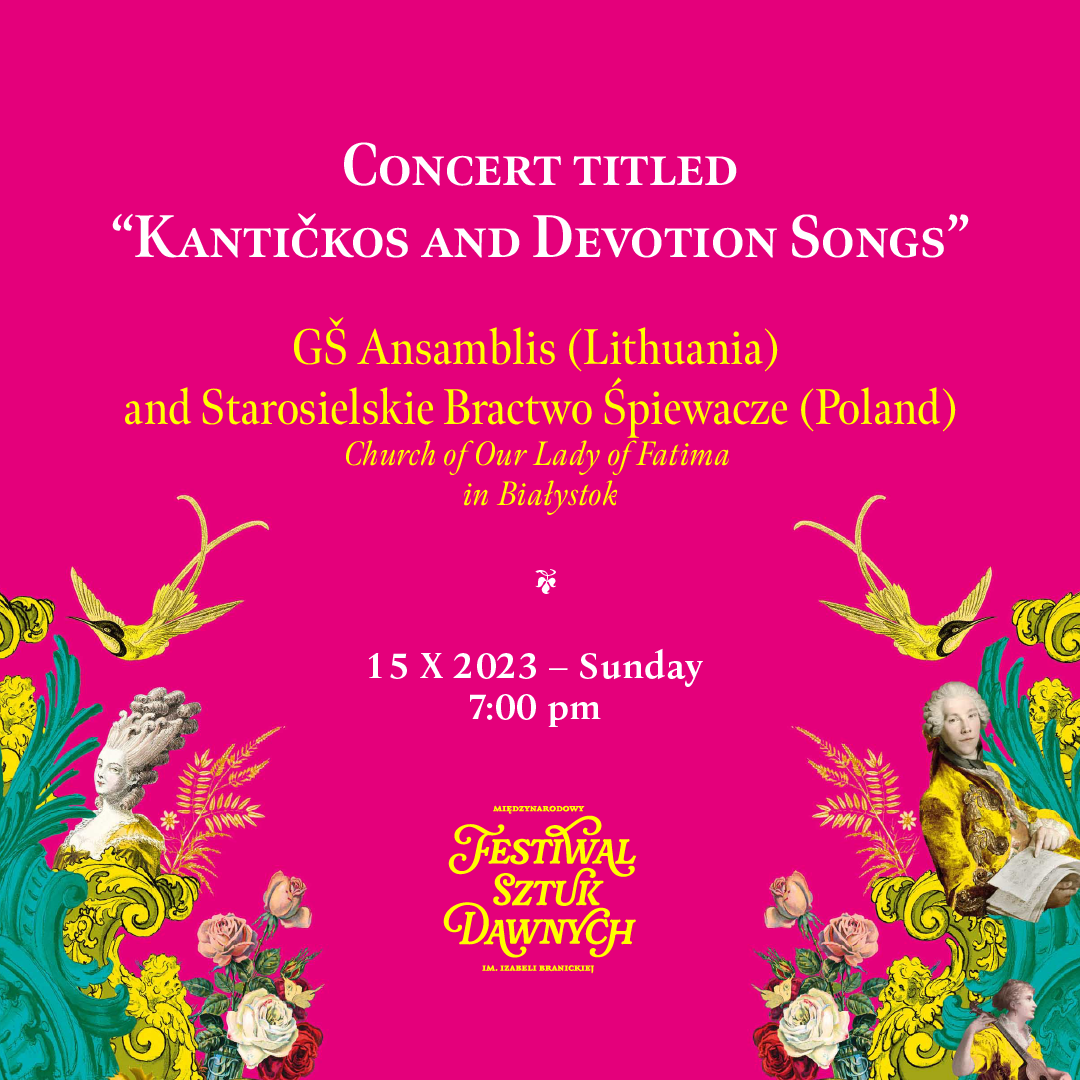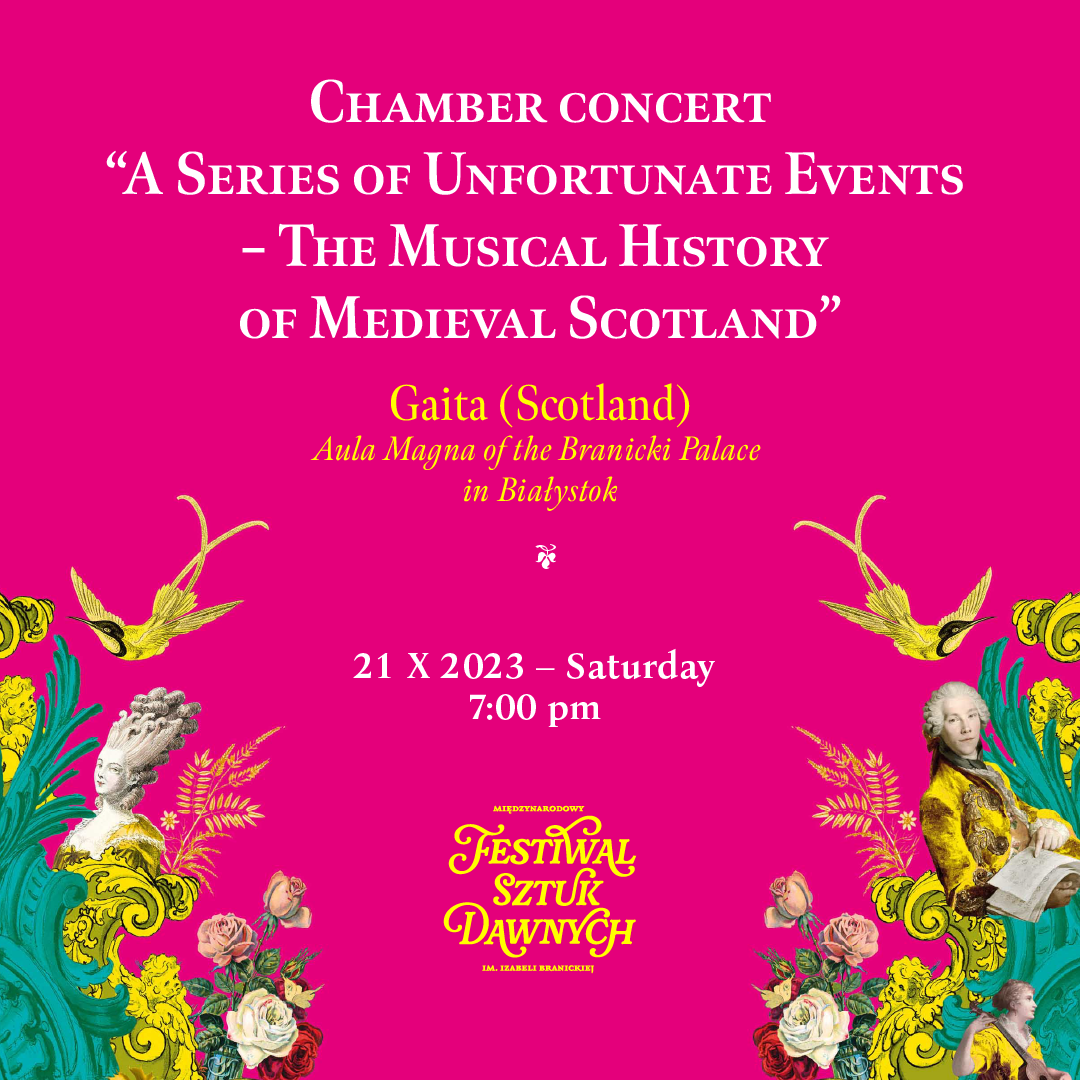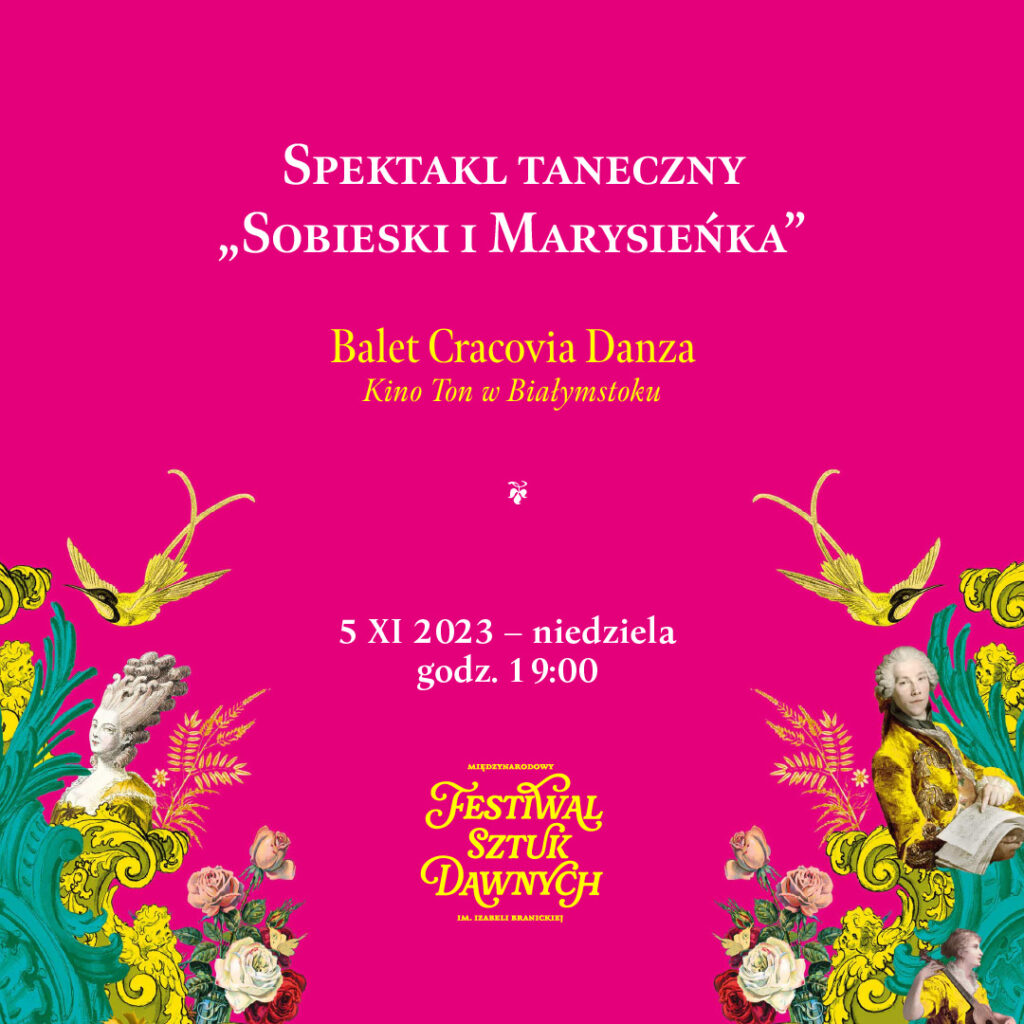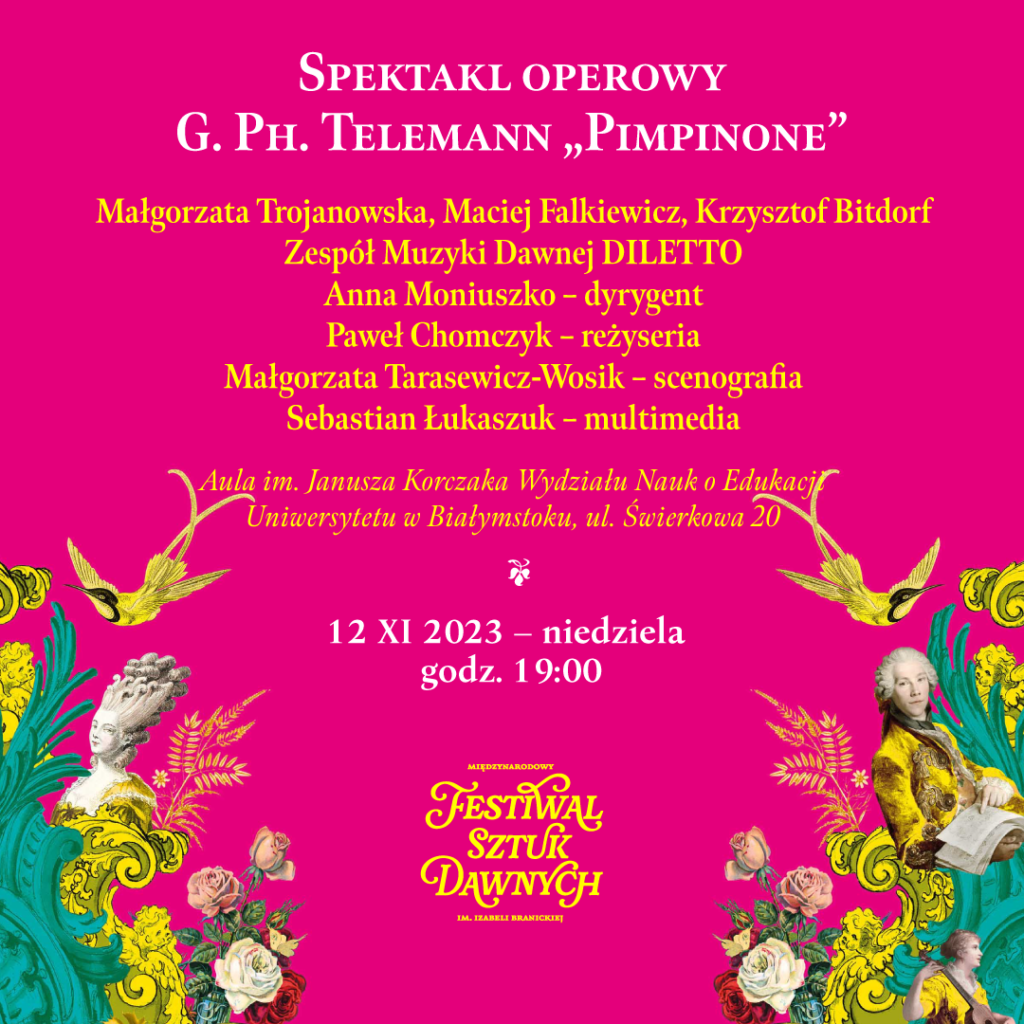1 October – 12 November 2023
International Izabela Branicka Festival
of Early Arts 2023
13th edition
The Festival will last from 1 October 2023 to 12 November 2023.
Since 2021, the Festival has been operating in an expanded formula, wanting to present the most interesting phenomena in the performance of broadly understood early music from the Middle Ages to the 19th century. In the upcoming editions, we will also add a motto directing the early arts presented.
In 2023, the Festival will be held under the slogan “Music from the thatch and
the manor”, presenting mainly secular early music from all over Europe. We will
start with France and the medieval Songs of Colin Muset in the “Wine, Women
and Song” programme by Jacek Kowalski, and then travel with the Gait ensemble
to medieval Scotland and hear a short history of Scottish kings, courts and musicians of the 13th and 14th centuries. On 8 October, we will commemorate the
anniversary of the death of Jan Klemens Branicki during the concert “Music of
the Polish-Lithuanian Commonwealth” – a harpsichord recital on the occasion
of the 700th anniversary of Vilnius performed by Alina Rotaru (Lithuania). In
the vast Vilnius Diocese, to which Białystok once belonged, many musical traditions coexisted, which will be presented by groups from Poland and Lithuania,
presenting Devotional Songs performed by the people of the borderland under
the roofs of Podlasie and Lithuania. By exploring secular court music, we will
stage a dance performance of Sobieski and Marysieńka performed by the Cracovia
Danza ballet and to the festival finale (12 November) – the premiere performance
of the opera by G. Ph. Telemann Pimpinone.
We wish you a pleasant experiences!
All events are available free of charge online.
You are welcome to come.
PROGRAMME
1 October 2023 (Sunday) 07:00 pm
Chamber concert ”Wine, women and song. Songs of Colin Muset”
Aula Magna of the Branicki Palace in Białystok
Performers:
- Jacek Kowalski and the Saint Louis Club
Event description:
COLIN MUSET
One of medieval France’s most famous and performed trouvrees – poets and singers. He lived in the mid-13th century on the border of Champagne, Burgundy and Lorraine. He left behind a number of songs, mostly preserved with musical notations, in which he invariably returns to the theme of fun, carefree feasting and wandering around castles in search of a good “sponsor”. He usually puts a personal “signature” in them – exposing himself, his name and his nickname. Thus, in literary terms, he was the ancestor of Villon, Pantagruel and Colas Bregnon – but being older than them, he is the first of the French poets who gave their work such a characteristic aura of self-irony and love of “women, wine and songs”. Since other sources are silent about him, information about his life and work must be obtained from the works themselves. This is what Gaston Paris, one of the classic scholars of ancient French literature, did: Colin Muset was undoubtedly a professional singer. He spent the winter like a proper townsman with his wife and daughter, in a house where there was no shortage of comforts, where there was both a servant and a maid; and when spring came, he mounted his horse loaded with saddlebags, put his goose and bow on his back, and wandered among the castles to entertain great lords and ladies. He certainly played various songs for them, songs about great deeds and love songs, tribudels and pastorels . But he wove his songs between them, which gave him a high rank among minstrels. The complete works of Colin Museta in Polish language versions were released on the album of Klub Św. Ludwika in December 2022
JACEK KOWALSKI
Songwriter, Sarmatian, art historian, lover of Old Polish poetry and translator of Old French poetry. He sings his own songs about old times and his own translations of songs from old times. He performs with the following ensembles: Monogramista JK (classical instruments) and Klub Świętego Ludwika (old instruments). He has published several dozen books, records, and popular and scientific publications about old Poland and old France’s culture, art and literature.
AGNIESZKA OBST–CHWAŁA
Violinist and fidelist, founder and artistic director of the Early Music Ensemble Sabionetta, operating since 2004. Since 1989, associated with the Zamość Early Music Ensemble Capella all' Antico. He cooperates with many Early Music ensembles: Ars Cantus, Dekameron, La Tempesta, Ars Nova, Il Tempo, Klub św. Ludwika, Alta, Narol Baroque Early Instruments Ensemble and with early dance groups. He also performs with folklore and folk bands, including: with the band Swoja Drogą and ZPiT "Zamojszczyzna". She has recorded many albums with early music, folk music and music written for theater performances. He is one of the founders and board member of the Early Music Circle, operating since 2010 at the Main Board of the Association of Polish Art Musicians in Warsaw.
TOMASZ DOBRZAŃSKI
A musician who plays old and modern wind and plucked instruments, contemporary and historical. He manages the Wrocław band Ars Cantus, which has prepared numerous recordings of unknown Wrocław and Silesian music. He also performs as a soloist. Author and co-creator of numerous recordings and publications as well as musical arrangements of dance and theater performances. Artistic director of the Forum Musicum Early Music Festival in Wrocław. Builder of ancient instruments. Educator and popularizer of early music.
JAN KIERNICKI
A musician who plays the lute, arch-lute, medieval guitar and hurdy-gurdy. He sings medieval liturgical monody and Renaissance polyphony, improving in these areas primarily under the guidance of Marcel Pérès from France. He is the founder and artistic director of the Lúthien Consort. He performs at concerts and festivals in Poland and abroad - in Lithuania, Italy, the Czech Republic, France and Belgium, with the bands Jericho, Klub św. Ludwik, Ania Broda, Maria Klich, Morgaine, Jacek Hałas and Camino Polaco. Organizer of the annual early music festival Poznań Katharsis Festival.
JACEK MUZIOŁ
Drummer musician collaborating with various artistic institutions (including NFM Wrocław). Founder and artistic director of the Repercussion percussion group and the originator and organizer of the Drumbattle Rhythm Festival. He uses his artistic experience in working with young people as a percussion teacher at the Music School Complex in Legnica and the Primary School No. 2 in Wrocław. In 2011, together with a group of Wrocław drummers, he established the Repercussion Foundation, which initiates many cultural projects, including running the Drumlinic drum school.
8 October 2023 (Sunday) 05:00 pm
Music of the Polish-Lithuanian Commonwealth harpsichord recital on the occasion of the 700th anniversary of Vilnius “Chiara e lucente stella”
Museum of Podlasie City Hall in Białystok
Performers:
- ALINA ROTARU – harpsichord (Lithuania)
Event description:
The first half of the 17th century brought cultural flourishing in the Polish-Lithuanian Commonwealth. Famous musicians from all over Europe were invited, whose music was heard in churches, courts and schools at various levels. In the Grand Duchy of Lithuania, the separate Society of Jesus, founded in 1608, brought a flourishing of the practice and study of sacred music, and the university founded in Vilnius in 1579, with its excellent vocal-instrumental chapel, various musical instruments and a rich music collection, was also one from the main places of musical performance and musical practice, thus keeping pace with the music and culture of the Kingdom of Poland. Alina Rotaru’s research, for which she received a scholarship from the Lithuanian Cultural Council in 2019, mainly focuses on studying three sources of Jesuit Baroque (Braunsberg , Kraziai and Sapieha). However, in this programme, she highlights the broader space of the Polish-Lithuanian Commonwealth’s keyboard music and the already distinguished genres of “Polish music” on the examples of manuscripts from Königsberg and Wittenberg and the Düben manuscripts.
ALINA ROTARUShe studied piano and choral conducting at her hometown’s music conservatory, Bucharest. After moving to Germany in 1999, she studied harpsichord with Siegbert Rampe and Wolfgang Kostujak in Duisburg, Carsten Lohff and Detlef Bratschke in Bremen and Bob van Asperen in Amsterdam. So far, she has performed as a soloist in most European countries, as well as in Japan, South America and the United States. She teaches at the University of Fine Arts in Bremen (Germany). Her solo recordings of harpsichord works by JP Sweelinck, JJ Froberger and English virginalists received excellent reviews in the music press, which put her on the list of the most outstanding harpsichordists of the young generation. In addition to her musical career, Alina Rotaru has been the organiser of the Bremen Music Festival since 2013. She has also worked as a music producer on several classical productions, some of which were released on Sony Classical /Deutsche Harmonia Mundi. Alina Rotaru currently lives in Vilnius, Lithuania. Together with violist Darius Stabinskas. She founded the MORGAINE ensemble, which debuted in 2016.
15 X 2023 (Niedziela) godz.19:00
Concert titled "Kantičkos and Devotional Songs"
Church of Our Lady of Fatima in Białystok
Performers:
- GŠ Ansamblis (Litwa)
- Starosielskie Brotherhood of Singers (Poland)
Event description:
GŠ Ansamblis and the Starosielski Brotherhood of Singers. Saint With a joint concert, Stanisława takes listeners to the world of traditional singing, showing the interpenetration of melodies, performance styles and singing traditions at the crossroads of Lithuanian and Polish cultures. These are different languages, but one music that brings people together and allows for a communal experience of beauty and the elevation of the soul to God. Religious songs taken from the Catholic tradition of the Archdiocese of Vilnius (to which Białystok also belonged for centuries) will be presented. The common history of the Polish-Lithuanian Commonwealth is also a commitment to getting to know each other, cultivating contacts and artistic cooperation today.
GŠ ANSAMBLISVilnius band founded to provide musical setting for the liturgy at the Sanctuary of Divine Mercy in Vilnius. The band members fulfill their task not only by singing during the liturgy, but also by deepening their knowledge about the place of their service, its past, and the broadly understood tradition of religious music in Lithuania. When working on the repertoire, they draw inspiration from both early music and traditional music. In 2022, the band released the album Clavis Coeli with liturgical music from an 18th-century manuscript of the Vilnius Bernardines.
STAROSIELSKIE BROTHERHOOD OF SINGERS. ST. STANISŁAWThe group has been operating in Białystok since 2013 as part of the Ministry of the Latin Tradition of the Archdiocese of Białystok. The subject of his interests and activities is the reconstruction and performance of traditional songs, derived from Polish ritual (folk), customary and patriotic traditions. The group annually takes part in the Evenings of Remembrance of Captain Witold Pilecki (since 2014) and in traditional singing workshops and concerts during the Starosielski May Day Festival (since 2015). In 2019, together with the Jericho Ensemble and Bartosz Izbicki, he inaugurated the International Festival of Early Arts. Izabela Branicka, and also performed during the Old Polish Culture Festival "Starosielskie Presentations". In 2020, he performed during the Republic of Poland Tradition Day and the Old Polish Culture Festival "Starosielskie Presentations". His singing also adds splendor to Independence Marches in Warsaw, performing patriotic and religious songs. In 2023, it is implementing the educational project "Workshops with the Brotherhood of Singers" at the Castle in Pułtusk, addressed to men interested in traditional singing, aimed at integrating the musical environment and getting to know each other about singers who share the religious and patriotic values promoted by the group.
21 X 2023 (Sobota) godz. 19:00
Chamber concert - "A Series of Unfortunate Events - The Musical History of Medieval Scotland"
Aula Magna of the Branicki Palace in Białystok
Performers:
- Gaita (Scotland)
Event description:
The history of the medieval Scottish kings, from the dynasty founded by Malcolm Canmore to the Stewarts, is a series of brief periods of stability and hope punctuated by disaster and misfortune. Beset by the troubles of the English, the Norwegians, the papacy and, most often, their own nobility, these kings rarely died in peace.
The programme tells a short history of Scottish kings, courts and musicians of the 13th and 14th centuries. It includes music written in Scotland (St Andrews Music Book, Inchcolm Antiphoner), music exploring the attitudes of others towards Scotland and other contemporary sources, all interwoven with a narrative overview of this fascinating period of Scottish history and its relationship to music.
GAITA
A Scottish band specializing in medieval music, which performs its music in a medieval context. The core of the band's repertoire is secular and court music from medieval Europe - especially from Scotland, France, Spain and Italy.
November 5, 2023 (Sunday) 19:00
Dance performance - Sobieski and Marysieńka
Ton Cinema in Białystok
Performers:
- Cracovia Danza Balett
Event description:
A loud romance, great love, a happy marriage and great politics united Jan III Sobieski and Maria Casimire d'Arquien, known as Marysieńka. The extraordinary relationship of the royal couple, which is perfectly reflected in King John's Letters to his beloved wife, preserved to this day, became the inspiration for the Cracovia Court Ballet's performance Danza Sobieski and Marysieńka. The main theme of the performance are the events related to the king's triumphant return from Vienna, the 350th anniversary of which we celebrate in 2023. The language of dance and pantomime shows the waiting for the winner, the touching meeting of the spouses after a long separation and the great spectacle prepared for her husband by Marysieńka. The show captures the atmosphere of the Polish royal court, where Polish, French and Oriental cultures intertwined in the 17th century. They compete in dance, so in the performance Polish and French courtiers and Turks defeated by Sobieski and brought to the Polish-Lithuanian Commonwealth demonstrate their skills. The performance also includes references to the culture of antiquity, so valued in the times of Sarmatia.
Staging: Romana Agnel, Choreography: Romana Agnel, Leszek Rembowski, Costumes: Monika Polak-Luścińska, Props: Maciej Luściński
BALET CRACOVIA DANZA
Founded by Romana Agnel, a dancer and choreographer, is the only professional historical dance company in Poland specializing in baroque dance. Choreographies composed in various styles and techniques, often recreated from old treatises, elaborate costumes, and excellent music - these are the characteristics of the Ballet's performances. The group's current repertoire includes over 20 performances ranging from the Middle Ages to the 20th century. The group also promotes the Polish dance tradition. The ballet takes part in many prestigious cultural events throughout Poland and abroad. Moreover, since 2000, Cracovia Danza has been organizing the Court Dance Festival in Krakow, which attracts dance masters from all over the world to the Vistula River. Education is also an important element of the team's activities. The ballet continues the activities of the Ardente Sole Court Ballet and the Foundation operating under the same name, founded in 1998 by Romana Agnel. The institution was established with the aim of creating the best possible working conditions for dancers creating a unique, unique professional historical dance group in Poland, boasting many significant artistic and organizational successes as well as achievements in the field of popularizing high culture and artistic education.
ROMANA AGNEL
Dancer, choreographer, dance teacher, art historian; founder of the only professional Court Ballet in Poland, Cracovia Danza (formerly "Ardente Sole") - Municipal Cultural Institution in Krakow, of which she is the General and Artistic Director. A graduate of the Social Ballet School in Krakow (class of Prof. M. Mirocka). She graduated in art history from the University of Paris (Sorbonne). In France, she learned the dances of various nations and specialized in character and historical dances ("Le Ballet Légendaire d'Ile de France", "Le Bal Paré", 7th Conservatory in Paris, "Thěâtre Baroque de France"). She is also a dancer of the Indian classical dance Bharata Natyam, which she learned from Smt. M. K. Saroja in Madras. She collaborated with outstanding personalities from the world of ballet, theater and music, developing choreographies for baroque, classical and old Polish operas presented on stages in Poland and abroad. She is the author of choreography and stage movement for performances presented in many theaters (including the J. Słowacki Theater, STU Theater, Ludowy Theater, "Groteska" Theater in Krakow; K. Dejmek Nowy Theater in Łódź; Rampa Theater in Warsaw) and in Operas and Musical Theaters (including Theater Atelier Lyrique in Tourcoimg, Theater Champs Elysées in Paris - France; Conservatory Theater in Oberlin - USA; Concertgebouw in Amsterdam - the Netherlands; Margraves' Opera in Bayreuth - Germany; Theater " "Pod Palmovkou" in Prague - Czech Republic; Warsaw Chamber Opera, Krakow Opera - Poland). The artist collaborated with outstanding musicians and conductors (E. Stefańska, U. Bartkiewicz, M. Pomianowska, K. Baumann, T. Karolak, Wł. Kłosiewicz, V. de Kort, J.-C. Makgoir, J. Ter Linden , S. Stadler, S. Standag, K. Weiss) and directors (J. Stokalska, L. Adamik, A. Carré, K. Dejmek, Wł. Nurkowski, J. Polewka, R. Peryt, A. Weltschek, G. Wiśniewski, K. Zanussi). Romana Agnel is the creator of most of the choreography for the performances of the Cracovia Danza Court Ballet and the originator and Artistic Director of the "Cracovia Danza" Court Dance Festival, which takes place annually at the turn of July and August in Krakow. In addition, she conducts regular classes in historical dances at the Academy of Music in Krakow and at the FCUM - Phila in Białystok, as well as numerous courses and lectures in her specializations. For years, he has been promoting the classical Indian dance Bharatha Natyam in Poland and abroad, at the same time being an ambassador of Polish and European dance in India.
November 12, 2023 (Sunday) 19:00
Opera performance - G.Ph.Telemann - Pimpinone - comic opera
Janusz Korczak Aula of the Faculty of Educational Sciences University of Białystok, ul. Świerkowa 20
Performers:
- Małgorzata Trojanowska – Vespetta (soprano)
- Maciej Falkiewicz – Pimpinone (bass)
- Krzysztof Bitdorf – Ferrando Sapermentire
- Paweł Chomczyk – direction
- String Orchestra of the Early Music Ensemble Diletto conducted by Anna Moniuszko
- scenography
- Sebastian Łukaszuk — multimedia
Event description:
PIMPINONE
Vespetta, a clever maid, is looking for a wealthy and naive husband who will be able to free her from the humiliation of plebeian life. The young maid wraps the old Pimpinone around her finger, who entrusts her with the keys to his own cash register and takes her as his wife. The girl transforms from a very nice being into a real hag, her only goal is to make quick money and a good social position. So we are dealing with a cruel farce, without any trace of love illusions. When the new lady of the house parades around town dressed in the most beautiful dresses, the old husband trembles before her hellish temperament and carefully planned intrigues.
GEORG PHILIPP TELEMANN (1681-1767)
An outstanding German composer of the Baroque era. His life was dominated by an extraordinary passion for music, which blossomed already in his childhood. At the age of only 12, he created his first opera. Although his family wanted him to choose a more stable profession, his mother confiscated his musical instruments, but this did not stop his passion for music. Telemann not only studied law, but also developed his musical skills. He became a versatile musician, mastering many instruments, such as recorder and transverse flute, shawm, oboe, trombone, organ, harpsichord, violin, viola da gamba and double bass. Telemann began his musical career as musical director of the Leipzig Opera in 1702, and later took up the position of organist at the New Church in Leipzig. There he founded the Collegium Musicum, bringing together students, which contributed to increasing his reputation as a composer and conductor. The following years of Telemann's musical career included travels around Germany and employment in various positions, including bandmaster of the Counts of Promnitz. During this period, he had the opportunity to learn Polish folk music and dances, which became the inspiration for his later instrumental compositions. In 1721 he settled in Hamburg, where he served as a cantor and conductor of church music. There he developed his operatic work, becoming one of the most important opera composers of the late Baroque period. His operas competed with the works of Reinhard Keiser, and Telemann became the leading composer in Hamburg. Its importance in the history of music is enormous. Telemann was one of the most prolific composers of all time, leaving behind over 3,000 works. His music was extremely popular during his lifetime, although at some point it fell into obscurity, only to be appreciated again in the 20th century. Telemann maintained contacts with other outstanding composers, such as Handel and Bach, which influenced their mutual inspiration and exchange of ideas. Telemann also had the opportunity to encounter Polish music during his stay at the court of Count Promnitz in Żary. There he learned folk music and dance traditions, which influenced his compositions, which feature Polish motifs. His rich musical legacy includes cantatas, masses, passions, oratorios, operas, orchestral suites, concertos for various solo instruments, harpsichord pieces, sonatas and many others. Telemann became famous for his ability to create music accessible to a wide audience, which contributed to his popularity and influence on the development of baroque music.
MAŁGORZATA TROJANOWSKA
Soprano, graduate of two specialties at the Faculty of Instrumental and Pedagogical Studies in Białystok of the Fryderyk Chopin University of Music - choral conducting and solo singing in the class of prof. Ewa Iżykowska. She also trained her vocal skills during courses with outstanding singers, including: A. Garancia, O. Pasiecznik, I. Kłosińska, M. Rzepka. She is a winner of many vocal competitions, a scholarship holder of the Marshal of the Podlaskie Voivodeship, a two-time scholarship holder of the Mayor of Ełk, and a scholarship holder of the Minister of Culture and National Heritage. He has extensive and diverse professional experience. He cooperates with philharmonic orchestras throughout the country, with the Polish Radio Orchestra, the Polish Royal Opera, the Podlasie Opera and Philharmonic, and the National Forum of Music in Wrocław. He also appears at music festivals. Her repertoire includes opera parts of works including: Monteverdi, Handel, Mozart, Puccini, Moniuszko, Czyż, Krauze; parts of canonical oratorio works, including: Bach, Mozart, Haydn, Górecki, Kilar, as well as numerous songs, arias and operetta parts. Małgorzata Trojanowska cooperates with outstanding conductors and leaders,
MACIEJ FALKIEWICZ
Bass, baritone, graduate of the Fryderyk Chopin University of Music in Warsaw at the Instrumental and Pedagogical Faculty in Białystok, in the solo singing class of Cezary Szyfman and Aleksander Teliga, and the Postgraduate Song Studies at the FCUM in Warsaw. He improved his vocal skills during courses conducted by, among others, Olga Pasiecznik, Romuald Tesarowicz, Marcello Lippi, Jadwiga Rappé, Ryszard Karczykowski, Ewa Iżykowska, Marek Rzepka, Kai Wessel, Bogdan Makal, Bruna Baglioni. As a soloist, he took part in many concerts and festivals. He performed the solo part in the puppet show Coffee Cantata by J. S. Bach at the Białystok Puppet Theater, in the play Świętoszek Molière (directed by P. Aigner) in cooperation with the Theater Academy. A. Zelwerowicz in Białystok and in the play Bezbrzeża (directed by R. Drobniuch) in cooperation with the Coincidentia Group. In the 2018/2019 season, he made his debut at the Warsaw Chamber Opera as Bombalo in the play Night in the Apennines by S. Moniuszko (directed by R. Skolmowski). He also sang opera parts in Dido and Aeneas by H. Purcell, Bastien und Bastienne by W. A. Mozart, New Don Quixote by S. Moniuszko (directed by P. Chomczyk), Don Pasquale by G. Donizetti (directed by J. Stokalska), The Haunted Manor S. Moniuszko (dir. B. Wiśniewska) during the 37° Festival Internazionale di Mezza Estate in Italy and the Mediterranean Festival of Cultures of the Kallithea Commune in Athens and S. Moniuszko's Haunted Manor (dir. W. Zawodziński) in Seville. He is a laureate of vocal competitions such as: Tournament of Music Academies (2nd place, 2019), 1st National Vocal Competition for Conductors Dirigere e cantare (1st place, 2018), 19th International Vocal Competition Iuventus Canti, (2nd place, Vrable /Slovakia/ 2017) , 1st National Bella Voce Vocal Competition (1st place, Busko Zdrój 2017), 2nd National Vocal Competition named after Krystyna Jamroz (3rd place, Busko Zdrój 2016), 13th National Moniuszko Competition Aria and Evensong (2nd place and the Chancellor's Cup of the FCUM, Białystok 2015). Currently, he is an artist of the Warsaw Philharmonic Choir and an instructor in the Białystok City Choir at the No. 11 Secondary School. rtm. W. Pilecki.
KRZYSZTOF BITDORF
Actor born on December 25, 1983 in Białystok, graduate of the Theater Academy. Aleksander Zelwerowicz in Warsaw, Faculty of Puppetry in Białystok. Theater and film actor. Since 2007, an actor of the Białystok Puppet Theater. He has over forty roles under his belt. He collaborated with directors such as Piotr Tomaszuk, Paweł Aigner, Paweł Chomczyk, Marian Pecko, Petr Nosalek, Waldemar Raźniak, Tomsa Legierski, Farbizio Montecchi and many others. Co-creator and regular participant of monthly BTL readings (as well as online readings). Juror in numerous recitation competitions. Host of author's literary meetings. Multiple participant of the Intergenerational Children's Literature Festival "Ojce i Dziatki". Winner of the "Competition for the staging of old works of European literature" organized by the Theater Institute and the Ministry of Culture. Awarded the Bronze Medal
Zasłużony dla Kultury Gloria Artis.
ANNA MONIUSZKO – CONDUCTOR
She graduated from the Fryderyk Chopin University of Music (specializing in conducting vocal and vocal-instrumental ensembles) and postgraduate choir master's studies at the Academy of Music. Feliks Nowowiejski in Bydgoszcz (2004), receiving diplomas with distinction. In 2010, she obtained a doctoral degree, in 2014 - a habilitated doctor in the specialty of conducting, and in 2023 the title of professor of art. In 2003, she started her professional career at the Białystok Branch of AMFC (currently the Fryderyk Chopin University of Music). In the same year, she took up the position of Second Conductor, and from 2017, Conductor of the Choir of the Medical University of Białystok, with which she won many awards at competitions in Poland and abroad, and was honored many times with special awards for the Best Conductor of the Competition. In 2005, she founded the DILETTO Early Music Ensemble, which specializes in performing Renaissance and Baroque pieces.
The ensemble's repertoire includes instrumental and vocal-instrumental works of the Baroque era, including great oratorios: Messiah and Israel in Egypt by G. F. Handel, Oratorio for the Ascension, Oratorio for Christmas, Oratorio for Easter by J. S. Bach, Oratorio for Christmas by H. Schütz, as well as passions: The Passion according to St. Jan J. S. Bach and G. F. Händel's Brockes Passion and the odes: H. Purcell - Hail, bright Cecilia! and G. F. Händel's Eternal source of divine light. DILETTO's artistic achievements also include stage performances of opera works by H. Purcell (Dido and Eneas and The Fairy Queen), G. B. Pergolesi (La Serva Padrona), J. Blow (Venus and Adonis), N. Piccinni (Polish premiere of the operas La buona figliuola and Il Cavaliere per amore), as well as A. Sacchini (Polish premiere of the opera La Contadina in corte). In her activities, Anna Moniuszko pays great attention to promoting the works of old Polish composers, including newly discovered ones, whose works are still unknown to a wider audience. In this trend, together with the DILETTO band, she recorded two albums: Andrzej Siewiński - opera omnia and Dawni Mistrzowie - newly discovered, which were released in the publishing series "Polska Muzyka Dawna" (Polish Early Music) by the prestigious DUX label. Anna Moniuszko is the winner of the Scholarship for Young Creators (2009) and the Scholarship for Professional Creators (2010) funded by the Mayor of Białystok. He is the originator and coordinator of the Białystok series of concerts Music of Baroque Masters, presenting the works of old composers in the historic interiors of Białystok. He is also the Artistic Director of the International Festival of Early Arts. Izabela Branicka, the idea of which is to present to contemporary audiences the culture and art from the times of the splendor of the Branicki manor in Białystok. Since 2016, he has been the Director of the International Choral Competition "Cantu Gaudeamus" in Białystok. In 2016, she was honored with the Artistic Award of the Mayor of Białystok for her entire artistic activity to date. In 2020, she received the Badge of Honor "Merit for Polish Culture". In 2022, she received the Artistic Award of the Marshal of the Podlaskie Voivodeship in the field of artistic creation, dissemination and protection of culture and the 1st degree Award of the Rector of the Fryderyk Chopin University of Music. Currently, he works as a professor at the Białystok Faculty of the FCUM and at the Art Department of the Faculty of Educational Sciences of the University of Białystok.
PAWEŁ CHOMCZYK
Actor, teacher, director, producer of shows. A graduate of the Theater Academy. A. Zelwerowicz in Warsaw, the Faculty of Puppetry in Białystok and the University of Białystok, Faculty of Pedagogy and Psychology. Professor at the University of Bialystok at the Faculty of Educational Sciences, lecturer at the Faculty of Instrumental and Pedagogical Studies, Music Education and Vocal Studies of the Fryderyk Chopin University of Music in Warsaw, Branch in Białystok. President of the board of the Coincidentia Creative Activities Foundation and member of the board of the Artistic Promotion Association. Co-founder of the independent theaters Kompania Doomsday and Grupa Coincidentia, as well as the Solniki 44 theater stage. Performances performed with and co-produced by Paweł Chomczyk were presented at theater festivals and impresario stages in Europe, North America and Asia. He is the winner of many individual acting awards (including the Grand Prix of the Paderewski Festival in Buffalo/U.S.A., the Grand Prix of the 4th International Kon-Teksty Festival in Poznań) and awards granted to performances that he co-created as a producer and actor (including The Bank of Scotland Herald Angel and Total Theater Award at the Edinburgh Fringe Festival). He was a scholarship holder of the Minister of Culture and National Heritage as part of the Young Poland program. He cooperated as an actor and director with the Dramatyczny Theater. A. Węgierki in Białystok, Białystok Puppet Theater, Baj Pomorski Theater in Toruń, Rampa Theater in Warsaw, Pinocchio Theater in Łódź, Polish Radio Theater, "Kubuś" Theater in Kielce, Teatroteka Młodego Czasa, Silesian Puppet and Actor Theater "Ateneum" in Katowice, the Radost Theater in Brno and as an academic teacher with the Department of Theater and Dance of the University at Buffalo (U.S.A.) and the Department of Puppetry of the Theater Academy. As a member of the international Krabat Ensemble, he maintains permanent cooperation with the German theaters Lindenfels Westfluegel Leipzig and Figurentheater Wilde&Vogel. In addition to theater performances, his artistic achievements also include roles in radio plays and film productions. Artistic director of the International Theater Festival in the Forest - LasFest and the Theater Festival in the Forest - LasKids.
MAŁGORZATA TARASEWICZ-WOSIK
Born in Białystok in 1976. Craftswoman, producer and maker of objects, props, dolls and costumes, set designer, artist. Since 1999, she has been active in the theater field, in particular puppet theater and form. Creator of projects and performer of scenography for alternative, private and institutional theaters in Poland and international artistic groups, also active in the field of her own research in the field of material, texture and conceptual art. A graduate of Puppet Theater Technology at the Theater Academy. A. Zelwerowicz in Warsaw Branch in Białystok (2018-2021). Second-year master's student at the University of Białystok, majoring in cultural studies, specializing in film studies (2021-2023, master's thesis defense on July 10, 2023). Winner of the 3rd International Theater Form/Puppet Competition "Animatus" (2020). Scholarship holder of the Minister of Culture and National Heritage for outstanding artistic achievements (2020). Winner of the Golden Mask for the best children's play "Noniek" in the Silesian Voivodeship (2022).
DILETTO - EARLY MUSIC GROUP
The band was founded in 2005 as an expression of interests and explorations in the performance of early music. Its members include both vocalists and instrumentalists. Artistic direction is provided by founder and conductor Anna Moniuszko. The band's repertoire includes instrumental and vocal-instrumental works of the Baroque era, including great oratorios: Messiah and Israel in Egypt by G. F. Handel, Oratorio for the Ascension: Lobet Gott in seinen Reichen by J. S. Bach, as well as passions: J. . S. Bach – Passion according to St. Jan and Brockes Passion by G. F. Handel and the odes: H. Purcell Hail, bright Cecilia! and G. F. Handel's Eternal source of light divine. DILETTO's artistic achievements also include stage performances of H. Purcell's operas Dido and Eneas and The Fairy Queen, G. B. Pergolesi's La Serva Padrona, J. Blow's Venus and Adonis, N. Piccinni (Polish premiere of La buona figliuola and Il Cavaliere per amore). and A. Sacchini (Polish premiere of the opera La Contadina in corte). The idea that guides the artists in the group is to present early music in accordance with the requirements of historical performance style. In its activities, DILETTO pays great attention to promoting the works of old Polish composers, including newly discovered ones, whose works are still unknown to the wider audience. In this trend, the DILETTO band recorded two albums titled: Andrzej Siewiński - opera omnia and Old Masters - newly discovered, which were published in a series by the "Polska Muzyka Dawna" (Polish Early Music) publishing house of the DUX label. The group regularly participates in festivals, including: East of Culture - Another Dimension, Early Arts Festival - Izabela Branicka's Name Day, Salesian Summer in Przemyśl and Forum Musicum in Wrocław.
